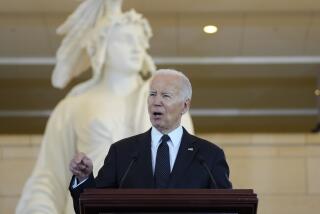U.N. Rescinds Its Zionism Censure : Israel: Branding of movement as racist is revoked by the General Assembly. The lopsided vote reflects the growing power of the United States in the world body.
- Share via
UNITED NATIONS — The General Assembly voted Monday to revoke its 16-year-old resolution branding Zionism as “a form of racism and racial discrimination,” marking a dramatic, overwhelming reversal of one of the most contentious positions the world body has ever taken.
Repeal came on a vote of 111 to 25, with 13 countries abstaining. The lopsided margin represented a clear victory for an intensive, worldwide lobbying campaign by the Bush Administration. It also demonstrated the extraordinary influence of the United States at the United Nations and the dwindling power there of the old Third World bloc.
Israel has long chafed under the original racism resolution. The Jewish nation looks on itself as the culmination of the Zionist movement and regards Zionism as the century-old movement to create a national homeland.
Its officials were jubilant over the repeal. As soon as the vote tally was announced, Israeli Foreign Minister David Levy and Israel’s U.N. ambassador, Yoram Aridor, hugged each other.
“There has been a sobering up,” Levy, speaking in Hebrew, told a news conference later. “Many people have switched their position. They have switched from darkness to light.”
Although Arab and Muslim states formed the bulk of those countries opposing the measure’s repeal, six Arab countries--Egypt, Kuwait, Morocco, Tunisia, Oman and Bahrain--decided not to take part in the vote, not even to abstain. Levy interpreted this as a plus for Israel.
Singling out Egypt, the only Arab state that has relations with Israel, Levy said: “We would have liked Egypt to support it. But I must say that Egyptian Foreign Minister Amir Moussa called me to explain his country’s absence from the vote. This is the beginning of a turnabout, and we are going to try to help this process.”
U.S. Deputy Secretary of State Lawrence S. Eagleburger, who introduced the repeal resolution in the General Assembly, said “it is more than time to consign one of the last relics of the Cold War to the dustbin of history.”
Repeal of the Zionism-racism resolution, he added, would recover for the United Nations “its reputation for fairness and impartiality.” The original resolution, victimizing a people who already have been “the victims of one of the most barbarous acts known to man,” he said, “was one of this body’s most ungenerous acts.”
The action would improve the volatile situation in the Middle East, he insisted, because “for 16 years, the existence of the Zionism-is-racism determination has stood in the way of those who want to see the United Nations play a more significant role in the peace process.”
In Washington, after the vote, President Bush received a phone call from Israeli Prime Minister Yitzhak Shamir, who thanked Bush for his role in helping to bring about the historic reversal. White House Press Secretary Marlin Fitzwater said the vote “enhanced the U.N. credibility and serves the interest of peace.” He added that Bush was “gratified that his call for repeal . . . has now received the overwhelming support of the international community.”
But Lebanese Ambassador Khalil Makkawi, speaking on behalf of Arab delegations, derided the claim that repeal would improve prospects for peace.
“This claim is negated by a record that proves beyond any shadow of a doubt that when Israel is placated, it becomes more defiant rather than compliant,” he said. “To put it mildly, the adoption of this draft resolution would hinder the peace process. Its approval would not only whet the appetite of Israeli extremists wishing to pursue their policy of creeping annexation, it would also serve to fuel the passions of those Arabs who believe that the whole peace process is an exercise in futility.”
Although Eagleburger tried to paint the original resolution as a Soviet-inspired maneuver during the height of the Cold War, it was actually regarded in 1975 as a defiant act of the Third World against the wishes of the United States. Countries such as Mexico and Nigeria, which hardly regarded themselves as allies of the Soviet Union, voted for the resolution then to show their solidarity with the rest of the Third World.
The reaction to the 1975 vote was swift and caustic. Mexico, which depends heavily on tourist revenue, suddenly found itself boycotted by many American groups that had planned to hold conventions there. Luis Echeverria, then president of Mexico, dispatched a Cabinet member to Israel to lay a wreath at the grave of Theodore Herzl, founder of Zionism, and called a delegation of American Jewish leaders to Mexico City to try to mollify their anger.
The United Nations was held up to ridicule. And Sen. Daniel Patrick Moynihan (D-N.Y.), then U.S. ambassador to the United Nations, used the Zionism vote to prove his contention that the Third World was choking life out of the organization. When the repeal vote was passed, Moynihan could be seen on the floor of the General Assembly shaking hands with many delegates.
The original resolution, as Eagleburger said in his speech, had the effect of telling Israelis “that their national existence was illegitimate.”
The campaign to repeal the resolution, talked about for years, was set off in September when Bush told the General Assembly that “by repealing this resolution unconditionally, the United Nations will enhance its credibility and serve the cause of peace.”
Lobbying began in earnest two weeks ago when the State Department announced that the United States intended to call for a vote before the 1991 session ended. U.S. officials said the Bush Administration mounted a drive that included entreaties by U.S. ambassadors, official messages and telegrams and personal phone calls to heads of state and to foreign ministers from the President and Secretary of State James A. Baker III.
Far more lobbying was done abroad than at the United Nations because, as an American diplomat put it, “the delegates here tend to be more radical than the governments back home.” A Third World solidarity develops at the U.N. that is not always embraced in capitals around the world, he explained.
The Administration concentrated on four main areas to gather votes: Europe, Latin America, the Far East and Africa.
Europe was the easiest to court. Most of Western Europe voted against the resolution in 1975.
The Cold War’s end made it easy to line up Eastern European votes. In 1975, the Soviet Union, Hungary, Poland, Czechoslovakia and Yugoslavia had voted for the Zionism-racism resolution. This time, all voted for repeal.
Latin America, which had supported the resolution heavily in 1975, switched, as well. The key came, an American official said, when the United States won Mexico’s support “early on.” Venezuela, which abstained in 1975, made no promises for a long while, but finally decided to vote for repeal. In the end, the only Latin American country to oppose repeal was Communist Cuba.
Asia, U.S. officials said, was difficult at first, but the mood changed when Japan, after hesitation, agreed to co-sponsor the resolution. Japan abstained in 1975.
“Until the very last,” an official said, “the Indians weren’t saying how they would vote.” In the end, India, which voted for the 1975 resolution, voted for repeal.
“Africa was the hardest area to deal with,” the U.S. official said, because so many of the countries supported the Arab position in 1975. Ambassadors worked hardest with those countries that already have resumed relations with Israel or are contemplating doing so. The lobbying paid off: All Africans voted for repeal or abstained, except for Somalia and the Sudan.
Despite their obvious satisfaction over the vote throughout most of the world, American officials were somewhat disappointed with the Arab vote. They had expected Saudi Arabia, Jordan and the United Arab Emirates to abstain or absent themselves from the vote. Instead, all three voted against repeal.
In the dwindling Communist world, Vietnam, North Korea and Cuba voted against repeal, but China decided not to vote at all.
Changing Sides
Here are key U.N. members who switched their stand on “Zionism is racism,” voting for the resolution in 1975 and then to repeal it Monday: Albania, Brazil, Bulgaria, Burundi, Cambodia, Cameroon, Cape Verde, Congo, Cyprus, Czech., Gambia, Grenada, Guyana, Hungary, India, Madagascar, Malta, Mexico, Mongolia, Mozambique, Nigeria, Poland, Portugal, Rwanda, Sao Tome-Prin., Soviet Union, Ukraine, Yugoslavia
More to Read
Sign up for Essential California
The most important California stories and recommendations in your inbox every morning.
You may occasionally receive promotional content from the Los Angeles Times.













